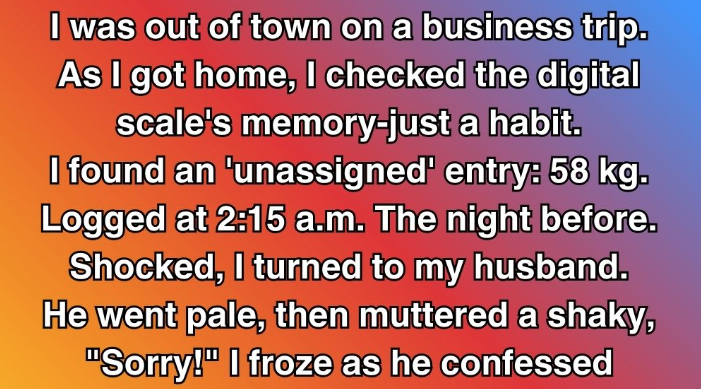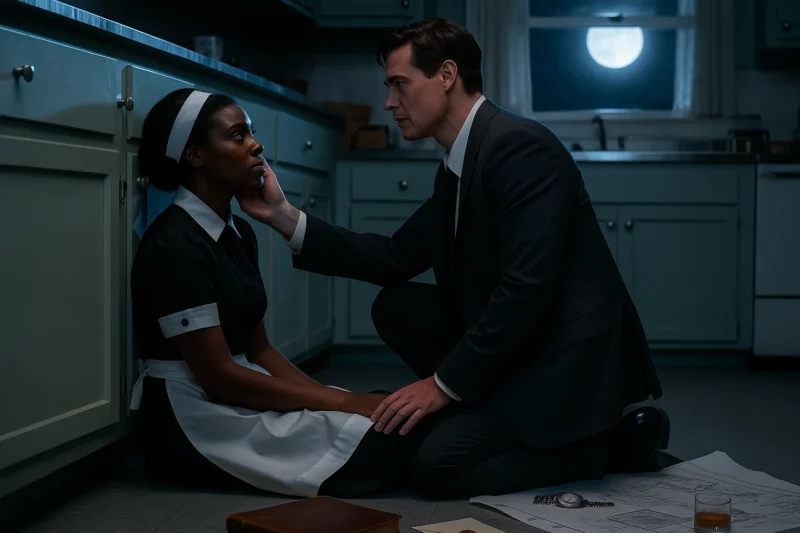I was away on a business trip, out of town.
When I returned, I glanced at the digital scale’s memory—a routine check.
An “unassigned” entry caught my eye: 58 kg. Recorded at 2:15 a.m. The previous night.
Stunned, I faced my husband.
His face drained of color, and he stammered, “I’m sorry!”
I stood frozen as he confessed.
His voice broke. “It was her. I didn’t mean for it to happen. She… appeared at our door.”
Words failed me at first. My head buzzed.
Eight years of marriage. Flawed, yes, but this? A betrayal etched in a scale’s log?
I steadied myself against the bathroom doorframe. My chest ached from my pounding heart.
“Who is she?” I forced out.
He sank onto the tub’s edge, looking like a scolded boy.
“Her name’s Sujin. We dated years before I met you. She moved back recently. Said she was struggling, going through a bad breakup.”
“And you let her stay here?” I snapped.
He flinched. “Only for one night. I planned to tell you. She was crying, drunk, said she had nowhere else.”
I couldn’t tell what sickened me more—his deception, or the scale that exposed it.
It was as if our home itself had revealed his secret.
I walked away.
He trailed after me, but I grabbed my keys and purse and left.
I drove to my sister’s house across town, numb.
She was half-asleep when I arrived, but one look at my face, and she welcomed me in.
Over wine and tissues, I shared everything.
Even the scale’s role. We laughed through tears—because who discovers infidelity like that?
“58 kilos. Hope she was worth that exact weight,” my sister quipped, refilling our glasses.
We sat quietly for a while. Then she asked, “Will you leave him?”
“I don’t know,” I whispered.
It wasn’t one night of weakness that shattered me.
It was his choice—to let another woman into our home, our bed.
While I was away, working to support our future.
I didn’t speak to him for three days.
He sent texts, called, even emailed.
Said he’d do anything—therapy, even quitting his job if needed.
But my mind kept circling back to that weight entry.
A tangible mark of betrayal.
On the fourth day, I met him at a café near our home.
He looked exhausted—dark circles, wearing the same shirt from days ago.
He slid a notebook across the table toward me.
“I wrote it all down. Every message she sent. Every moment. I wanted you to see how it began.”
I read it. Sujin had initiated contact.
A casual “hey stranger” on Instagram that spiraled quickly.
He replied too warmly, too eagerly.
The red flags were there.
He saw them.
And still stepped into her trap.
He said, “I didn’t betray you before that night. But I let her in emotionally first. That’s my fault.”
He was honest.
And he didn’t shift blame or make excuses.
He cried. Apologized without strings attached.
But I didn’t return home that night.
I needed more time.
While at my sister’s, I grew curious about Sujin’s “breakup” story.
Something felt off.
I searched her online. Found her LinkedIn.
She didn’t live nearby—she was three hours away.
Strange.
Her social media told a different tale.
No signs of heartbreak.
Instead, fancy cocktails, hotel lobbies, posts from various cities.
One post, dated two days before she arrived at our house, read:
“Some men are too easy. Game on.”
My stomach twisted as I stared at the screen.
I sent it to my sister.
She replied: “You think she targeted him?”
I wasn’t certain.
But I began to suspect this wasn’t a simple affair.
What if it was deliberate?
I asked my husband for Sujin’s full name.
He provided it immediately.
I hired a private investigator.
Yes, it sounds drastic. But my instincts screamed that something was wrong.
This wasn’t only about my marriage anymore. It felt larger. Unsettling.
Two weeks later, the investigator’s report arrived.
Sujin had a history.
Two restraining orders—one for harassment, one for fraud.
She’d deceived two men in three years—one sued her for stealing $12,000.
Both described “brief emotional relationships” that ended in turmoil.
One called her “a walking red flag dressed in silk.”
I showed the report to my husband.
His face paled, but this time it was fear, not guilt.
“She asked to borrow money,” he admitted softly. “I didn’t tell you because I refused. She said she was behind on rent. I said no. She acted strange after that.”
I leaned closer. “Did you see her again?”
He shook his head. “She left before I woke up. Said she’d get a cab. Never contacted me again.”
I believed him. For the first time in weeks, I truly believed him.
And then it sank in:
He’d been foolish. Weak. But not malicious.
He didn’t invite this chaos—he simply failed to stop it in time.
We chose couples therapy.
Not because I forgave him instantly, but because I didn’t want to make a permanent choice in the heat of anger.
We needed to understand why this happened.
Therapy was raw at first.
I hated hearing him speak of his loneliness, how distant we’d grown.
I was lonely too. And I didn’t betray him.
But I listened. He listened to me.
We sat through heavy silences and painful tears.
Unraveled years of small hurts we’d both ignored.
The affair was merely a symptom of deeper wounds.
Six months later, we were stronger.
Not flawless, but stronger.
We moved to a smaller apartment. Restarted our routines.
Began dating each other again.
Then came an unexpected twist.
One evening, a knock at the door.
Police.
They asked if we knew a woman named Sujin.
My husband tensed. “Yes. Why?”
She’d been arrested in another city—for fraud and impersonation.
She’d used our address on a fake rental application.
We were floored.
The officers assured us we weren’t in trouble, just needed our statement.
But I felt the universe had delivered a strange kind of closure.
I told the officer, “She stayed here once. One night.”
He nodded. “Sometimes that’s all it takes.”
After they left, we sat in silence for a long time.
Then I laughed—a deep, genuine laugh.
“She tried to use us. Again,” I said, shaking my head.
But this time, we were prepared.
Together.
I don’t see karma as a cosmic tally, but I believe in clarity.
Sujin’s brief reappearance tied up a loose thread we hadn’t realized was dangling.
Our marriage broke open.
But we didn’t discard it.
We mended it with care, like kintsugi—the Japanese art of repairing with gold.
The cracks remain visible.
But they’re part of our story now. Part of who we are.
I still check the scale occasionally.
Not from fear, but as a reminder: truth always finds a way to surface.
If betrayal has ever blindsided you, hear this:
What feels like an ending can be a spotlight, illuminating what you couldn’t see before.
Forgiveness isn’t surrender.
It’s choosing to create rather than destroy.
Thank you for reading.
If this resonated, please share—it might guide someone toward their next step.




